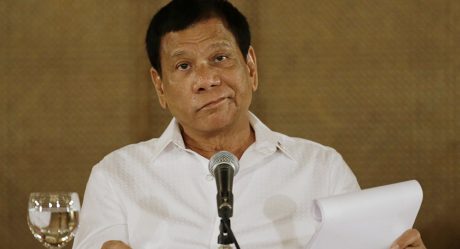
Philippine President Rodrigo Duterte is already two years into his term. While he is not the first presidential candidate to be elected on the promise of change, he is possibly one of the few under whom Filipinos feel that it is genuinely happening.
Duterte has done quite a few things differently from his predecessors. He has adopted a foreign policy that is not defined primarily by being Uncle Sam’s loyal terrier. As the first president from the Mindanao region, he gives more due attention, and not just lip service, to its development. The way he openly criticizes “untouchable” institutions like the Catholic church and the mainstream media is considered unheard of.
While Duterte may be indeed rocking the boat, so to speak, if there is any change that is occurring, it is relegated to the political and economic aspects of life in the Philippines. But how far can the momentum of president Duterte’s drive for change go?
For long-lasting change to take place, it must reach all the way to the root of Filipino dysfunction: the Filipino culture. The way things are going, Duterte’s “change”, while it may inspire Filipinos to think that a better tomorrow is possible (pwede naman pala), will ultimately fail to have any real effect on Filipinos.
He cannot unite them.
The greater good, all-encompassing concept of the Filipino does not exist, not in the way that, for example, America and Americans are defined beyond the fifty states that make up the Union. Instead, Filipinos have remained regionalist, tribal, and ultimately loyal only to their self-interests.
The current opposition to president Duterte’s administration is composed of people and groups who lost the previous presidential election (and still can’t get over it). Also added to the mix are communist/socialist groups who are interested only in the overthrow of those whom they don’t like. What further complicates things is that the opposition is more interested in ousting Duterte through whatever means possible, rather than presenting a clear, rational, and realistic alternative to the way he’s running the country now.
The underlying culprit, however, the reason there is inability to unite, is the way Filipinos approach unity. Most of them simply cannot put their egos aside; the way they regard unity is that others must submit to them. You will be hard-pressed to find the “win-win” mindset among Filipinos. Although there are Filipinos who can practice the delicate art of winning enemies over through gentle persuasion, a lot of others view engagement with non-allies as a zero-sum game – “only I must win; everyone else must lose.”
No matter how hard Duterte tries to reach out to all Filipinos, some of them (including he and his supporters) are just plain stubborn, insufferable, and incorrigible. And they would rather stay that way.
He cannot instill an appreciation for the rule of law.
As has been pointed out in Get Real Post many times before, Filipinos have this baseless sense of being more important than everyone else. The rule of law is as close to a logical, rational method of ensuring fairness among people as you can get. Unfortunately, this doesn’t sit well with many Filipinos because not having an undue advantage over others is simply unacceptable to them.
As it stands, Filipinos will not abide by the rule of law by themselves. Most of them will do so only under the threat of forces stronger than them. And even then, they will pull out the victim card, cry foul, and use their “pitiful” state to make excuses as to why they should be “special”.
He cannot wean them from their meek, deferential, subservient, and submissive collective character.
President Duterte recently made headlines when he criticized the Catholic Church in the Philippines. The church, and primarily the Catholic Bishops Conference of the Philippines (CBCP), have widely been perceived to be meddlesome in political affairs, and to hold politicians by the neck with the prospect of “votes”. He has also made headlines for criticizing the West for the way developing countries are “shamed” for not towing the liberal/politically correct line.
It is fairly obvious that without a figurehead like Duterte at the helm, Filipinos would never have thought of criticizing the CBCP and the church for their hypocrisy. They would never have thought of revisiting just why religion has such a deep stranglehold on the Filipino psyche. And they would have never thought of criticizing the West for their hypocritical and lopsided regard towards developing countries who don’t tow liberal lines.
Filipinos are known for being an enduring people – “matiisin in the vernacular. Enduring doesn’t mean that it’s good that they can outlast discomfort; it means that they would rather bear the indignity of the problem, rather than confront it. It doesn’t help that Filipinos are an emotional people who easily capitulate to the loudest voice in the room.
While a powerful figurehead is a great help to any movement for change, it must not be dependent on that alone. The Filipino fixation on personalities, instead of ideas, is truly one of the biggest hindrances to deep-rooted change and enlightenment.
The challenge to Filipinos is simple: they need to show themselves that they can overcome their cultural inertia, and keep the momentum of change going, even after president Duterte’s term ends.

No comments:
Post a Comment